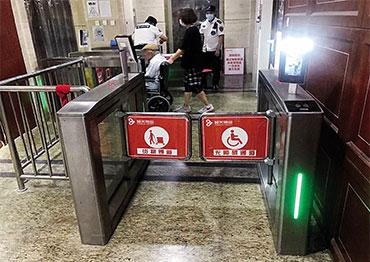China’s first court case involving facial data was in October 2019 when Guo Bing, an associate law professor at Zhejiang Sci-Tech University, sued Hangzhou Safari Park for denying him entry after he refused to scan his face. The park argued it had updated their system from fingerprinting to facial recognition for increased security, but the court sided with Guo. It ordered the park to delete Guo’s facial data, including the photos he provided for an annual pass to the park, and pay his legal fees.
The following year, Hangzhou government passed a regulation forbidding property management agencies from forcing residents to submit to face scans, the first of its kind nationwide. Guo was invited to hearings to draft the regulation.
Sichuan provincial government followed suit in 2021 and revised property management regulations to contain similar clauses found in Hangzhou’s regulation.
Nationally, facial recognition data is covered in China’s Law of Personal Information Protection, which took effect on November 1, 2021. According to the Law, protected “sensitive information” includes biometric data, religious beliefs, health and medical care information, financial records, geolocation data and the personal information of minors under 14 years old. Any use or gathering of such information requires full permission from its owner.
But Lao said this is far from enough.
“The parts on protecting sensitive information only focus on permission, while other parts resemble existing laws concerning ‘ordinary information,’ so it does not fully enhance the legal status of sensitive information,” she told NewsChina.
Lao expressed concern that Article 26 – which says that collected identity information may be used in cases of public security – would be subject to abuse.
“‘Public security’ could refer to any location outside homes, including subways, communities and even corridors and stairs. So we have to define this term clearly or risk legalizing inappropriate collection of facial data,” she said.
At a forum held by research institute Hong Fan Legal and Economic Studies this January, experts called for clearly defined boundaries for collection of facial data, especially under the umbrella of public security.
“Seeing so many cameras in public places, I don’t know which are legal and which are not, let alone why the information is being collected,” Xu Ke, director of the Study Center for Digital Economy and Law Innovation, University of International Business and Economics in Beijing said at the forum.
“I suggest posting QR codes beside each camera that reveal who installed it and why, where the information will be stored and what department to contact in case of disputes... No matter if the information is for public security or private enterprise, the public should have the right to know,” he added.
Lao agrees. “The present law emphasizes ‘autonomy’ over the collection and use of [sensitive] information, but in many cases, the public knows nothing about the risks, which greatly weakens that ‘autonomy,’” she said. “The law should focus more on the protection and use of [sensitive] information and its deletion,” she added.
At the January forum, experts called for separate legislation involving facial recognition technology. “Department rules or local administrative regulations will usually prioritize the interests of government departments which are processing the data themselves and should be subject to the laws,” Lao said at the forum. “As individuals are often disadvantaged in disputes with government departments and enterprises, we need stronger laws to protect the disadvantaged,” she added.
In the 2019 case, Guo Bing requested that a third-party witness be present when Hangzhou Safari Park deletes his facial data, which the court denied.
Given that Chengji Center in Tianjin still has not provided proof that they deleted Gu’s facial data or given him a physical key, Gu is once again appealing to the courts to intervene.

 Old Version
Old Version

